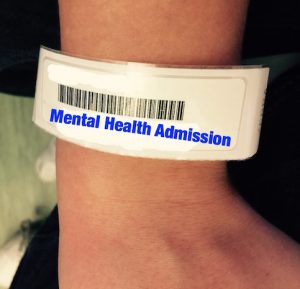| Recently, I had to take an unexpected what-I-call Life Hiatus. My mental health had gradually deteriorated to the point were I was having severe and erratic mood swings. Everyone’s mood fluctuates throughout the day, but not to the extremes I was experiencing.
People talk about good and bad days with depression. I was having good, bad, okay or mixed mood states lasting between 45 minutes to 4-6 hours. These mood swings were unpredictable with no pattern. They didn’t have triggers and were not related to a critical inner voice. These mood swings were torturous. See My Mood Swing Table below for details of what these mood swings were like. |
I felt desperate for the mood swings to end. To the point of having suicidal ideation and a clear plan of action.
I had thought that I was objective about my mental health. But because the mood swings had gradually got worse I hadn’t realised how unwell I was. I sought help because three people close to me said that I wasn’t well. Luckily I had these people around me and knew that could trust them, even if I couldn’t trust myself.
So I went to my local A&E. I was assessed by a Mental Health Nurse and together we decided that I needed admission. I stayed on the A&E Ward overnight, whilst I waited for an available bed on a mental health ward.
The next evening, I was transferred to a mental health ward. On arrival at the ward, my possessions were searched and Nursing Staff took my shoe laces, belt, hoodie (due to cord in hood), phone charger, lighters and medication. The ward layout was a square shaped main corridor with dormitories, individual rooms and many other rooms that where behind locked doors.
The first night was frightening. Everything about the place was frightening. The environment. The locked doors. The routine. The rules I hadn’t been told. The other patients. The staff. I even found my own mood swings frightening. At one point, I was physically shaking uncontrollably due to the fear and anxiety.
I was assessed by a Psychiatrist and commenced on 10 minute observations. It would be a few days before I was reviewed. At the time, I couldn’t understand why they appeared to be doing very little to help me and my state of mind. But afterwards, I realised that they had wanted to observe me and see my mood swings for themselves.
The Consultant Psychiatrist diagnosed me with a ‘Mood Disorder.’ Here is a definition of a ‘mood disorder:’
mood disorder –
noun
a psychological disorder characterized by the elevation or lowering of a person’s mood, such as depression or bipolar disorder.(From: Google, Last Accessed: Friday 27th November 2015.)
The Consultant Psychiatrist informed me that they were reluctant to give a more specific diagnosis on the first admission to a mental health ward. I told the Consultant Psychiatrist that I didn’t care what they called it, as long as they gave me some medication that worked. I explained that with some stability in mood, I could make further psychological and behavioural changes to help myself to get well and stay well.
I was started on Quetiapine, an antipsychotic and mood stabiliser medication. It was to help to take the edge off my mood swings and give me some stability of mood. I was also started on Mirtazapine, an antidepressant. This was to help to manage the depression/low moods.
Overall, I was an in-patient on the mental health ward for about 12 days. During this time, my Mum and good friend Steve were superb. They took over all my responsibilities and made sure that everything in the outside world was sorted, meaning that I didn’t have to worry about anything – apart from getting better.
I will never be able to thank Mum and Steve enough for what they have done for me, but I have repeatedly thanked them anyway. I will never be able to explain how much I appreciate them for everything that they have done for me, but I have tried to explain anyway.
I feel that I got to this crisis point because I waited so long to get referred to and assessed by Community Mental Health Services. It feels like Community Mental Health Services are designed to keep people out, rather than let people in to get the help and support that they need and in most cases are asking for. This is probably because of a lack of resources in mental health services. But this really doesn’t help and support people with mental health problems to get and stay well.
I have been discharged from the hospital and am and engaged with Community Mental Health Services. Recovery will be a slow and progressive one. I am taking the medication as prescribed, attending appointments with community services and setting myself daily goals that I am currently achieving.
Write soon,
Antony
| Physical Symptoms |
|
|
|
|
| Mental / Cognitive Symptoms |
|
|
|
|
| Emotional Symptoms |
|
|
|
|
| Behavioural Examples |
|
|
|
|



